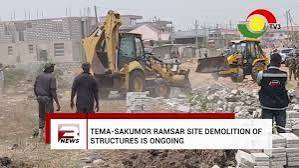Save Our Wetlands: Sakumo Ramsar Site Reclaimed in Bold Easter Monday Demolition!
On Easter Monday 2025, a powerful operation unfolded at the Sakumo Ramsar Site in Tema, Ghana, as illegal structures were demolished to protect this vital wetland. This decisive action, led by the Greater Accra Regional Security Council (REGSEC) and the Tema Development Corporation (TDC), marks a critical step in preserving Ghana’s ecological heritage and combating environmental degradation. With terms like “wetland conservation†and “illegal construction†trending on Google, the Sakumo Ramsar demolition has sparked global interest in sustainable urban development and environmental protection.
The Sakumo Ramsar Site, a 1,340-hectare wetland, is a cornerstone of Ghana’s environmental framework. Designated under the Ramsar Convention in 1992, it supports over 70 waterbird species, serves as a breeding ground for marine life, and prevents flooding in surrounding areas like Tema and Ashaiman. However, rampant encroachment by developers has reduced its core area, threatening biodiversity and increasing flood risks. The Easter Monday operation targeted unauthorized buildings in the wetland’s core zone, where construction is strictly prohibited due to its ecological sensitivity.
Led by Greater Accra Regional Minister Linda Obenewaa Akweley Ocloo, the taskforce, backed by National Security, demolished walls and structures erected despite prior warnings. “Encroachment on this core zone is illegal and unacceptable,†Ocloo declared, emphasizing the need to maintain the wetland’s ecological integrity. The operation wasn’t just a one-day event; plans for a taskforce to ensure long-term sustainability are underway, aligning with Ghana’s commitment to the Ramsar Convention, which promotes wetland conservation globally.
This bold move resonates with trending topics like “climate action†and “sustainable development.†Wetlands like Sakumo are natural flood barriers, absorbing excess water and protecting communities. Yet, illegal construction has narrowed drainage channels, risking disasters like the Weija floods. The demolition sends a clear message: Ghana is prioritizing environmental stewardship over unchecked urbanization. As President John Dramani Mahama recently stated at the 2025 Eid-ul-Fitr celebration, addressing flooding requires tackling unauthorized developments head-on.
The Sakumo operation also highlights community and stakeholder collaboration. The Tema and Nungua Traditional Councils have endorsed efforts to reclaim encroached lands, while the Forestry Commission has pushed for innovative solutions, like fencing the core zone. Public sentiment on platforms like X reflects growing support, with posts praising the government’s resolve to protect wetlands. However, challenges remain—past demolition attempts faced resistance, including court injunctions, underscoring the need for consistent enforcement.
As “environmental protection†trends worldwide, the Sakumo Ramsar demolition is a call to action. It urges citizens to respect environmental laws and support conservation efforts. By safeguarding wetlands, Ghana not only preserves biodiversity but also ensures safer, flood-free communities. Join the movement—advocate for sustainable development and help protect our planet’s lifelines. The Sakumo Ramsar Site’s restoration is just the beginning!


